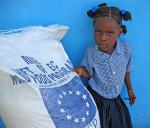WFP and The Hungry Times Ahead
 Though we are all different, we have this in common - we must eat to survive. In an ideal world, individuals, families, communities, and countries would be able to feed themselves. Needless to say, the world is less than ideal. For the poorest of the poor, climate change, population growth, environmental degradation and soaring food prices make feeding oneself increasingly difficult. The World Food Programme (WFP) plays a vital role in ensuring that vulnerable populations, including those affected by disaster and conflict, receive the food they need, in Haiti and worldwide.
Though we are all different, we have this in common - we must eat to survive. In an ideal world, individuals, families, communities, and countries would be able to feed themselves. Needless to say, the world is less than ideal. For the poorest of the poor, climate change, population growth, environmental degradation and soaring food prices make feeding oneself increasingly difficult. The World Food Programme (WFP) plays a vital role in ensuring that vulnerable populations, including those affected by disaster and conflict, receive the food they need, in Haiti and worldwide.
Most Americans will never have skipped a meal in their lives. If you do not eat for a day, you will be able to think about little else besides food. Perhaps Einstein's theory of relativity applies here. On a full stomach, a minute passes swiftly. On an empty stomach, it is an eternity. An empty sack will not stand up as Haitians say.
 The WFP is responsible for feeding hundreds and thousands around the world. It is a humanitarian rather than a political organization - they go where they are needed. Logistically, they are very strong and play a vital role in coordinating response to complex emergencies - including emergency telecommunications, moving staff members from various organizations, and getting emergency relief supplies from point a to point b where the vulnerable population is. Even if point b is a confict zone in the middle of nowhere.
The WFP is responsible for feeding hundreds and thousands around the world. It is a humanitarian rather than a political organization - they go where they are needed. Logistically, they are very strong and play a vital role in coordinating response to complex emergencies - including emergency telecommunications, moving staff members from various organizations, and getting emergency relief supplies from point a to point b where the vulnerable population is. Even if point b is a confict zone in the middle of nowhere.
 WFP provides food to victims of natural disasters and emergencies until they can resume their lives and livelihoods. Refugees such as in Chad, and the internally displaced as in Darfur depend on WFP pipelines for survival. If refugees and IDPs are not allowed by the host government (they often are not) to grow crops, then they are usually completely dependent on WFP for their daily food rations. The majority of refugees and IDPs are women - and WFP emphasizes women in its work.
WFP provides food to victims of natural disasters and emergencies until they can resume their lives and livelihoods. Refugees such as in Chad, and the internally displaced as in Darfur depend on WFP pipelines for survival. If refugees and IDPs are not allowed by the host government (they often are not) to grow crops, then they are usually completely dependent on WFP for their daily food rations. The majority of refugees and IDPs are women - and WFP emphasizes women in its work.
 We are entering a new chapter in the struggle against hunger, and not for the better. WFP notes that from 1970-1997, the number of hungry people dropped from 959 million to 791 million, largely a result of dramatic progress in reducing the number of undernourished in China and India. The number of chronically hunger has again started to increase. Developing countires such as China and India are consuming more, there are less food commodities, and they cost more.
We are entering a new chapter in the struggle against hunger, and not for the better. WFP notes that from 1970-1997, the number of hungry people dropped from 959 million to 791 million, largely a result of dramatic progress in reducing the number of undernourished in China and India. The number of chronically hunger has again started to increase. Developing countires such as China and India are consuming more, there are less food commodities, and they cost more.
 An article in the Washington Times notes higher oil prices are contributing to steeper food prices by boosting transportation costs, and severe weather is hitting many countries and hurting crop output. In addition, the dollar has plummeted. Considering that the United States is the largest donor to the WFP, as it is to most multilateral organizations, this results in a lack of purchasing power. Taken all together, WFP is able to buy 40% less food for hungry populations than it could five years ago.
An article in the Washington Times notes higher oil prices are contributing to steeper food prices by boosting transportation costs, and severe weather is hitting many countries and hurting crop output. In addition, the dollar has plummeted. Considering that the United States is the largest donor to the WFP, as it is to most multilateral organizations, this results in a lack of purchasing power. Taken all together, WFP is able to buy 40% less food for hungry populations than it could five years ago.
 Usually we speak glowingly of biofuels, and their potential to reinvigorate the agricultural sector and self-reliance of countries such as Haiti. However, the Food and Agriculture Organization, said yesterday that about 100 million tons of cereal grains are being diverted to the production of biofuels each year. Of that, nearly all is corn - 12 percent of all the corn consumed around the globe. Will we have energy security and food security together some day? I hope so, but we are not there yet. It is likely that, so long as depend on corn for fuel alternatives, we will not achieve that balance either.
Usually we speak glowingly of biofuels, and their potential to reinvigorate the agricultural sector and self-reliance of countries such as Haiti. However, the Food and Agriculture Organization, said yesterday that about 100 million tons of cereal grains are being diverted to the production of biofuels each year. Of that, nearly all is corn - 12 percent of all the corn consumed around the globe. Will we have energy security and food security together some day? I hope so, but we are not there yet. It is likely that, so long as depend on corn for fuel alternatives, we will not achieve that balance either.
WFP has a long tradition of working in Haiti. In the current funding environment, they will never be able to do all that they would like for Haiti or any other country for that matter. To the extent that it has the funding to do so, WFP continues school feeding programs which reach an estimated 290,000 primary school children, including children in the most insecure areas in north, northeast, west and Artibonite. WFP also works with the government on emergency preparedness, especially regarding the ever recurring flooding during the rainy seasons. Click here to learn more about WFP operations in Haiti. A description of Haiti's food needs in 2007 is attached.
 If you are interested in reading more about hunger, check out the World Hunger Report 2007. WFP works with more than 2,000 NGOs and you can learn more about partnering with them by clicking here. Also, frequently asked questions about WFP can be found here.
If you are interested in reading more about hunger, check out the World Hunger Report 2007. WFP works with more than 2,000 NGOs and you can learn more about partnering with them by clicking here. Also, frequently asked questions about WFP can be found here.
International humanitarian organizations such as the WFP have not been as effective at telling their stories and communicating the impact of their work to the world at large - In WFP's case, the food which they provide every day around the world prevents hunger and malnutrition while preserving health and hope for those who need it most - human beings like you and I with families, hopes, and aspirations for a better future.
 If you would like to support the work of WFP, there are multiple ways you can do so. At this link, you can learn more about their "red cup" campaign which intends to ensure a cup with food for all of the 59 million children who go to school hungry throughout developing countries around the world. You, your company, or an organization you belong to can contribute online by clicking here.
If you would like to support the work of WFP, there are multiple ways you can do so. At this link, you can learn more about their "red cup" campaign which intends to ensure a cup with food for all of the 59 million children who go to school hungry throughout developing countries around the world. You, your company, or an organization you belong to can contribute online by clicking here.
Alternatively, you can play the "Free Rice Game", which will test your vocabulary for you - the better you do, the more rice will be donated to the WFP on your behalf. A fun, cost free way to support this important organization.
Life, Hope, and Development - all require food. If you are looking for a charity to support, don't rule out an international organization such as WFP which is active both in Haiti and the worldwide. Without their work, the world would be a much bleaker place. Will Haiti be able to feed itself? I believe that day will come - until then, Haiti and other countries like it are lucky to have WFP.
Bryan
Add new comment